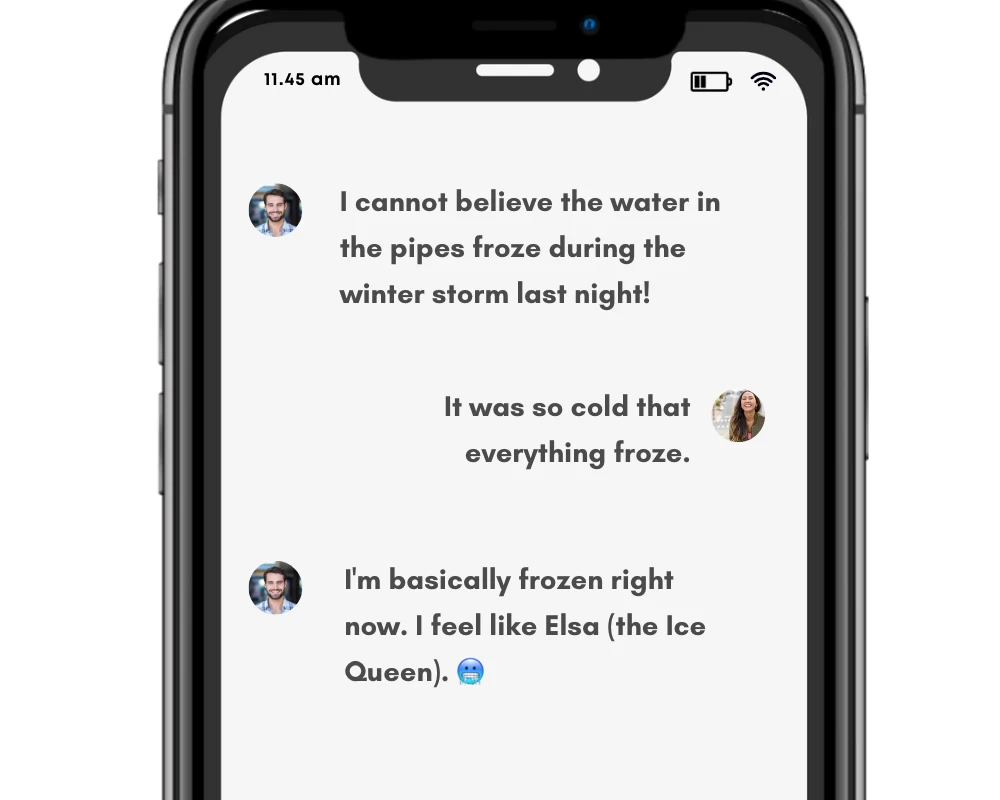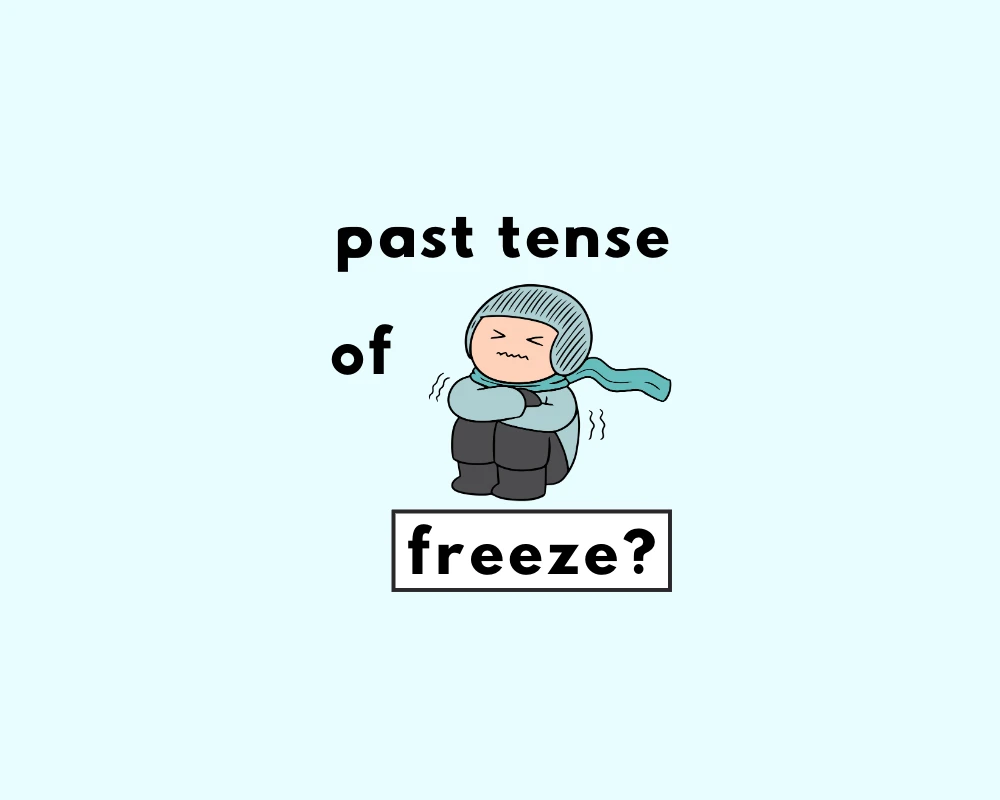
What’s the past tense of “freeze”?
The word and verb, freeze, refers to the action of, “to become hard, and often turn to ice, as a result of extreme cold: water freezes at 0°C,” as defined by the online Oxford Learner’s Dictionary. The verb freeze has 3 verb forms, and is an irregular verb in English since it doesn’t end in –ed in either of its past tense verb forms.
She froze with horror when she saw the body.
The pipes have frozen, so we’ve got no water.
The water freezed quickly.
He has froze to death.
Forms of the verb freeze
| present | past | future | |
| simple | I freeze | I froze | I will freeze |
| continuous | I am freezing | I was freezing | I will be freezing |
| perfect | I have frozen | I had frozen | I will have frozen |
| perfect continuous | I have been freezing | I had been freezing | I will have been freezing |
1. Freeze is in the present tense: It may freeze tonight, so bring those plants inside.
2. Froze is the simple past: She froze with horror when she saw the body.
3. Frozen is the past participle: The pipes have frozen, so we’ve got no water.
While the forms of freeze are strange by the standards and rules of English verb conjugations; (which explains the persistent misuse and widespread confusion amongst English speakers and irregular verb forms), these verbs are not all that irregular, considering the pattern and shared origin of many irregular verbs. Freeze in its verb forms behaves like other irregular verbs, such as speak, spoke, spoken; and rise, rose, risen.
Other irregular verbs like “freeze”
| base verb | past tense | past participle |
| freeze | froze | frozen |
| write | wrote | written |
| bite | bit | bitten |
| throw | threw | thrown |
| blow | blew | blown |
| ride | rode | ridden |
This transformation and ‘pulling down’ sound in the forms of a verb is known as the ablaut, and it reflects a Western Germanic (Proto-Indo-European) understanding of grammar and its senses or aspects. The ablaut is often conflated with the umlaut (pronounced um-lout), though there is a difference: goose/geese, and tooth/teeth or foot/feet all demonstrate the umlaut, which describes the lifting sounds within forms of a word to reflect some aspect of grammar (in this case is number).
The ablaut pattern, which, specifically is in the, “systematic vowel alteration in the root of a word to indicate shades of meaning or tense”, functions like the umlaut, though is an “off-sound” and not a lifting sound. It’s audible in the forms of numerous verbs such as the freeze, froze, and frozen, (bite, bit, bitten, and write, wrote, written; ride/rode/ridden, and so on).
What’s the difference between froze and frozen?
Past tense: She froze with horror when she saw the body.
Past participle: The pipes had frozen, so there was no water.
The participle form of a verb always uses a helper or auxiliary verb, which, for the past perfect tense, is had (had frozen). Broadly speaking, this is sufficient for most people to see the distinction between the past tense and the past participle forms of a verb. English never is that simple though, and if you thought it was—you are demonstrably mistaken (see what I did there?) Participles are not fixed tenses so to speak; they can refer to an action or event completed in the past or at a certain time, but pair with auxiliaries or helper verbs to be able to do so.
Pro tip!
Participles participate: think of participles as being participatory in the role of a verb, and so they need help. That’s why they call in their helper friends, the helper verbs, to get the full scope of the verb’s work done!
“freeze” past tenses, visualize “froze” for the simple past (like “froze”n food) and “frozen” for the past participle (something that’s already “frozen”).
Freeze in the simple present tense (in sentences)
Can you freeze this cake?
Some fruits freeze better than others.
It may freeze tonight, so bring those plants inside.
You can freeze the soup at this stage.
Most fresh herbs will freeze successfully.
Froze in the past tense (in sentences)
He was so surprised he froze to the spot.
The smile froze on her lips.
Jess froze in her tracks and took a deep breath.
Two of them froze to death.
She froze with horror when she saw the body.
Examples of the past participle frozen in sentences
He was frozen to death.
The pipes have frozen, so we’ve got no water.
The organ samples were immediately frozen in liquid nitrogen.
Ten degrees of frost had frozen the lock on the car.
Maggie’s face had frozen into a cold mask.
Origin of the word/verb freeze
From Etymonline on freeze (v.):
From Proto-Germanic freusan* “to freeze” (source also of Dutch vriezen, Old Norse frjosa, Old High German friosan, German frieren “to freeze,” and related to Gothic frius “frost”), from Proto-Germanic freus-, equivalent to PIE root preus- “to freeze,” also “to burn”.
Other commonly confused verb tenses
- What’s the past tense of spread?
- What’s the past tense of lead?
- What’s the past tense of choose?
- What’s the past tense of fly?
- What’s the past tense of lay?
- What’s the past tense of drive?
- What’s the past tense of draw?
Learn more about verbs
Work Sheet
According to the blog post, what is the simple past tense form of the verb “freeze”?
Which word is *not* a correct form of “freeze” mentioned in the blog post?
Based on the blog post, the form “frozen” is typically used as the:
The blog post states that the verb “freeze” is this type of verb because it doesn’t end in -ed in its past tense forms:
The systematic vowel alteration seen in verbs like freeze/froze/frozen, spoke/speak/spoken, and rise/rose/risen is referred to in the post as:
According to the post’s example, She ______ with horror when she saw the body.
Based on the post’s examples, The pipes have ______ , so we’ve got no water.
The post indicates that the incorrect sentence “The water freezed quickly” should correctly be “The water ______ quickly.”
The post indicates that the incorrect sentence “He has froze to death” should correctly be “He has ______ to death.”
The verb freeze has 3 verb forms, and is an ______ verb in English since it doesn’t end in –ed in either of its past tense verb forms.
Frequently Asked Questions
What is the past tense of freeze?
+
Is ‘freezed’ the correct past tense?
+
When should I use ‘froze’?
+
When should I use ‘frozen’?
+
Why is freeze considered irregular?
+
Yash, D. "What’s the Past Tense of Freeze? Froze or Frozen?." Grammarflex, Jun 15, 2025, https://www.grammarflex.com/whats-the-past-tense-of-freeze-froze-or-frozen/.
Sources
-
Etymology online, origin of freeze.











